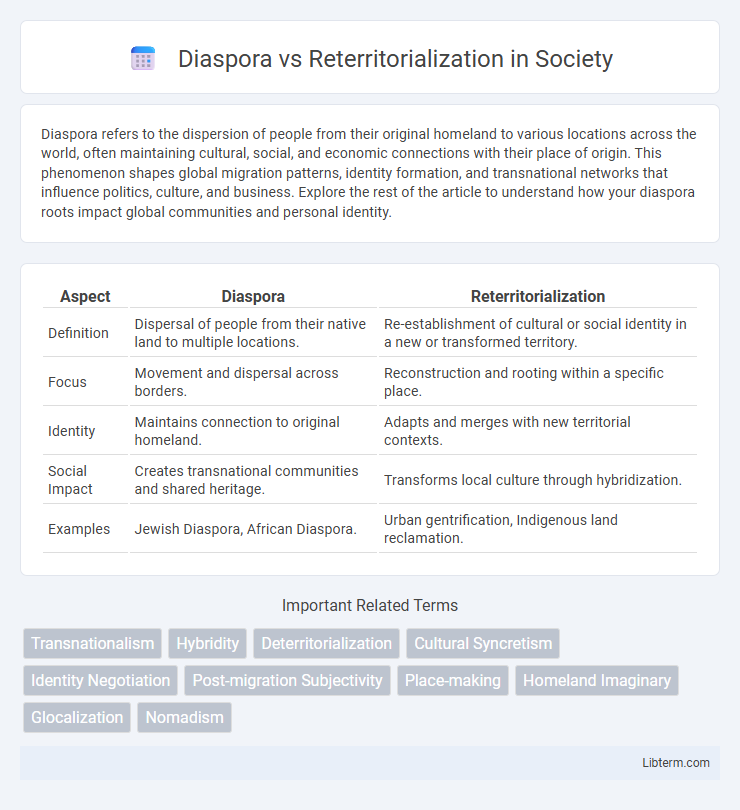Diaspora refers to the dispersion of people from their original homeland to various locations across the world, often maintaining cultural, social, and economic connections with their place of origin. This phenomenon shapes global migration patterns, identity formation, and transnational networks that influence politics, culture, and business. Explore the rest of the article to understand how your diaspora roots impact global communities and personal identity.
Table of Comparison
| Aspect | Diaspora | Reterritorialization |
|---|---|---|
| Definition | Dispersal of people from their native land to multiple locations. | Re-establishment of cultural or social identity in a new or transformed territory. |
| Focus | Movement and dispersal across borders. | Reconstruction and rooting within a specific place. |
| Identity | Maintains connection to original homeland. | Adapts and merges with new territorial contexts. |
| Social Impact | Creates transnational communities and shared heritage. | Transforms local culture through hybridization. |
| Examples | Jewish Diaspora, African Diaspora. | Urban gentrification, Indigenous land reclamation. |
Understanding Diaspora: Definitions and Key Concepts
Diaspora refers to the dispersion of people from their original homeland, often maintaining cultural, social, and emotional ties despite geographic separation. Key concepts include collective memory, identity preservation, and transnational connections, which shape diasporic experiences and influence community cohesion. Understanding diaspora involves analyzing how dispersed populations negotiate belonging and maintain their heritage across diverse sociopolitical landscapes.
Reterritorialization: Meaning and Significance
Reterritorialization refers to the process by which cultural identities and practices are reshaped or redefined as individuals or groups establish new social, political, or economic contexts after displacement. This concept highlights how displaced communities adapt by creating new connections to place, reconstructing meaning within altered territorial boundaries. Understanding reterritorialization reveals the dynamic ways migrants negotiate identity and belonging in response to both local and global forces.
Historical Contexts of Diaspora
Historical contexts of diaspora often involve forced migrations due to colonization, slavery, and political exile, which fragmented communities and dispersed populations globally. Reterritorialization refers to the processes by which these dispersed groups re-establish cultural, social, and political ties in new locations, adapting identities in response to new geographic and social realities. These dynamics reveal how diasporic identities continuously evolve through the interplay of displacement and localized reinvention.
The Process of Reterritorialization in Modern Societies
Reterritorialization in modern societies involves the reconfiguration of cultural, social, and political identities within new territorial contexts, often following diaspora movements. This process reshapes local practices and power structures by integrating diasporic experiences and global influences, fostering hybrid identities that challenge traditional notions of territory and belonging. Key examples include urban enclaves where migrant communities recreate cultural spaces, blending ancestral traditions with contemporary urban life.
Cultural Identity in Diaspora Communities
Diaspora communities experience cultural identity as fluid and dynamic, shaped by the processes of diaspora and reterritorialization. Diaspora involves the dispersal and maintenance of cultural practices across multiple geographies, preserving shared heritage despite spatial separation. Reterritorialization occurs as these communities adapt and reinterpret cultural identities in new locales, blending ancestral traditions with local influences to create hybrid cultural expressions.
Negotiating Belonging: Diaspora vs Reterritorialization
Negotiating belonging within diaspora communities involves the tension between maintaining cultural identity and adapting to new environments, contrasting with reterritorialization, where displaced groups assert control by reconstructing familiar social and cultural spaces. Diaspora emphasizes transnational connections and hybrid identities that transcend borders, while reterritorialization centers on embedding rootedness in specific localities through spatial and cultural reclamation. Both processes reflect complex strategies of negotiating home, belonging, and identity amid displacement and migration.
Transnationalism and Hybrid Identities
Diaspora communities exemplify transnationalism by maintaining connections across multiple nation-states, fostering hybrid identities that blend cultural elements from host and origin countries. Reterritorialization occurs as these groups reshape cultural, social, and political landscapes in new geographical contexts, creating hybrid identities that challenge traditional notions of belonging and citizenship. These processes highlight the fluidity of identity formation within globalized frameworks, emphasizing ongoing negotiations between local rootedness and transnational belonging.
Social, Political, and Economic Impacts
Diaspora communities reshape social dynamics by fostering transnational networks that challenge traditional notions of homeland and identity while promoting cultural hybridity and social cohesion. Politically, diasporas influence both host and origin countries through lobbying, remittances, and political activism, which can alter governance structures and bilateral relations. Economically, diaspora engagement drives development via remittances, entrepreneurship, and investment flows, significantly impacting labor markets and global capital distribution.
Case Studies: Examples of Diaspora and Reterritorialization
The Jewish diaspora exemplifies how displaced communities maintain cultural identity while adapting to new territories, showcasing a dynamic process of reterritorialization through the establishment of vibrant communal institutions in host countries. Similarly, the Puerto Rican diaspora in New York City illustrates reterritorialization by blending traditional practices with local influences, creating hybrid cultural expressions that reshape urban landscapes. These case studies highlight the ongoing interplay between preserving origins and forging new spatial identities in diaspora experiences.
Future Trends: Evolving Notions of Home and Identity
Diaspora communities are increasingly redefining the concept of home through digital connectivity and transnational networks, fostering hybrid identities that transcend geographic boundaries. Reterritorialization reflects a countertrend where displaced populations reclaim cultural spaces and local identities, often blending globalization with localized practices. Future trends indicate a dynamic interplay between virtual belonging and physical rootedness, reshaping how identity and home are experienced in a globalized world.
Diaspora Infographic

 libterm.com
libterm.com